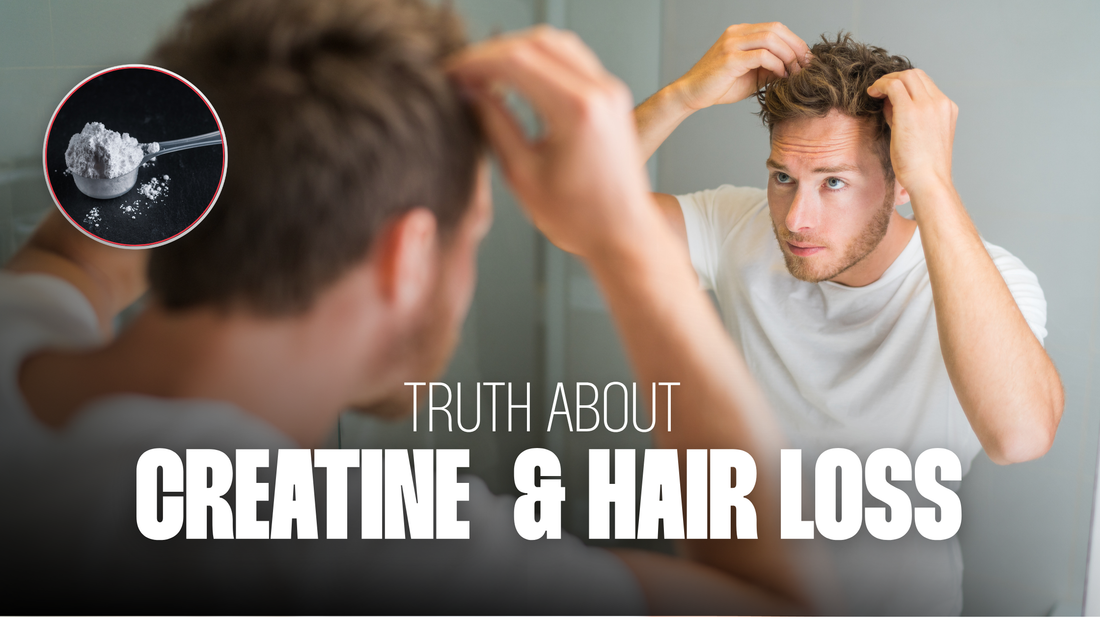
Can Creatine Cause Hair Loss? The Truth About Creatine and Hair Thinning
 Creatine’s Shady Reputation with Hair Loss
Creatine’s Shady Reputation with Hair Loss
You're on a mission. You’ve dialed in your workouts, started tracking macros, and decided to add creatine to your supplement stack. Gains incoming, right?
But then, bam—you hear it. Someone at the gym casually drops the bomb:
“Dude, be careful. Creatine can make your hair fall out.”
Wait, what? Now you're googling “can creatine cause hair loss,” spiraling through Reddit threads, and wondering if your swole dreams are about to cost you your hairline.
Let’s slow it down and really look at what’s going on here.
Why This Rumor Packs a Punch
Hair loss isn’t just a vanity concern—it’s emotional. Whether it’s a receding hairline, thinning crown, or just seeing too many strands in the shower drain, the fear is real. Add to that the internet’s tendency to amplify half-truths, and creatine’s rep has taken a hit.
What makes this rumor especially sticky is one small, misunderstood scientific study that seems to confirm it. And if you've ever read that 2009 South African study on rugby players and dihydrotestosterone (DHT), well... that’s the root (pun intended) of it all.
But don’t worry—we’re breaking it all down, minus the fluff.
What Science Really Says About Creatine and Hair Loss
What’s the Study Everyone Talks About?
Let’s rewind to 2009. A small group of 20 college-aged male rugby players participated in a study where they were given creatine monohydrate supplements over three weeks. Here’s what they found:
-
Their DHT levels increased by about 56% after the loading phase and stayed 40% above baseline during the maintenance phase.
-
DHT is a hormone derived from testosterone, often linked to male pattern baldness (androgenetic alopecia).
That’s it. That’s the study that launched a thousand hair loss headlines.
Here’s What That Study Didn’t Say
-
No one in the study actually experienced hair loss.
-
It never claimed that creatine directly causes hair loss.
-
There haven’t been any major follow-up studies to confirm or expand on the results.
-
The study group was tiny. Like, 20 guys tiny.
Okay, But What’s the Deal with DHT?
Good question. Dihydrotestosterone (DHT) plays a big role in hair follicle sensitivity. If you're genetically predisposed to male pattern baldness, elevated DHT levels could accelerate hair loss. But—and this is important—DHT alone doesn't guarantee hair loss.
So, unless you already have a genetic sensitivity, elevated DHT from creatine (if it happens at all) likely won’t make a difference.
What Do Major Health Organizations Say?
Spoiler: Nothing.
Neither the FDA nor large health organizations like Mayo Clinic or Harvard Medical School list hair loss as a side effect of creatine. Creatine is one of the most researched supplements in the world, and the data overwhelmingly supports its safety.
Let’s Talk Real-World Evidence
Here’s what we know from millions of users and over 1,000+ clinical studies:
-
Creatine is non-hormonal and doesn’t act like a steroid.
-
Long-term users don’t report significantly higher rates of hair loss than the general population.
-
Any anecdotal evidence ("my cousin's friend lost his hair on creatine") is just that—anecdotal.
So if creatine was a major hair loss culprit, we’d be seeing a lot more bald gym bros.
Can Creatine Cause Hair Loss? Here's the Bottom Line
Let’s wrap this up into something crystal clear:
-
Can creatine cause hair loss? There's no solid scientific evidence proving that it does.
-
Does creatine promote hair loss? Only one study showed a potential DHT increase, but it did not show any actual hair loss.
-
Will creatine cause hair loss? If you're genetically predisposed to male pattern baldness, it's possible DHT could play a role—but it’s not exclusive to creatine.
So unless you're actively fighting hair loss or have a family history of baldness, you probably don’t need to stress over creatine. Focus on consuming a good quality creatine with a proper dosing, hydration, and a balanced diet, and you're golden.
Rapid Fire Creatine + Hair Loss Edition
Q: Should I stop taking creatine if I'm noticing hair thinning?
A: First, confirm it's actually thinning and not normal shedding. If you're concerned, consult a dermatologist or stop for a few weeks to monitor any changes.
Q: Are there DHT-blocking alternatives to creatine?
A: There aren't direct substitutes with the same strength benefits, but you could consider beta-alanine or citrulline malate if you're worried. Always talk to a healthcare provider first.
Q: Can I use creatine if I’m on finasteride or minoxidil?
A: Yes, in most cases there's no interaction—but again, double-check with a medical professional.
Q: Is creatine safe for women worried about hair loss?
A: Yes! Women produce far less DHT than men, and there’s zero evidence linking creatine to female hair loss.
A Reality Check
Here’s the truth—we all want clear answers, especially when it comes to something as personal as our hair. But with supplements like creatine, things aren’t always black and white.
What we do know is that creatine is one of the safest, most effective performance boosters out there. And unless your DNA is already nudging you toward a receding hairline, you’re likely in the clear.
So go ahead—lift heavy, hydrate well, and enjoy the gains. Just keep an eye on your overall health, and listen to your body (and maybe your barber, too).




